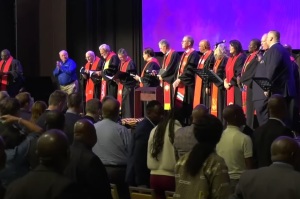Is Your Church Losing Blood?
American Christianity is far less bloody than it used to be.
Songs like "Power in the Blood" or "There Is a Fountain Filled with Blood" or "Are You Washed in the Blood?" are still sung in some places, but fewer and fewer, and there aren't many newer songs or praise choruses so focused on blood. The Cross, yes; redemption, yes; but blood, rarely. We're eager to speak of life, but hesitant to speak of blood.
And this is not only a Protestant phenomenon. Roman Catholics-centered as they are on the Eucharist-often seem to go out of their way to speak of the "real presence" of Jesus in the elements, without going so far as to mention that this presence is believed to be that of his body and blood, as well as soul and divinity. Even Catholic communion hymns, I'm told, prefer terms like "the Cup" to "the Blood."
The eclipse of blood in American Christianity has quite a bit to do, I suspect, with American prosperity.
The "blood medleys" once so popular in Evangelical hymnals evoke something of the blue-collar, socially marginalized origins of conservative American Protestantism. To sing "Are You Washed in the Blood of the Lamb" often seems too much of a reminder to upwardly mobile suburban professionals that their religion has "redneck" roots. (A Catholic writer suggests that this is also true of the reaction to traditional Catholic piety in the suburban churches filled with the successful descendants of immigrants.)
At the same time, these churches want to relate the gospel to a non-Christian culture. Often, we do so by being as antiseptic as possible: with gleaming restrooms and shiny foyers, with churches designed to look like malls, complete with information booths and coffee kiosks. We assume that making Christianity clean and bright will remove the sting of offense from the gospel.
More "sophisticated" churches avoid the subject of blood, although less sophisticated ones retain enough of the old ways to talk about blood but also to trivialize it. T-shirts ape beer commercials ("This Blood's For You)" or the tattoo culture ("My Life Was Saved by Body Piercing").
Some of this is the result of the lingering sting of liberal Christian hostility toward a "slaughterhouse religion." Some of it is the result of an age that fears blood, but doesn't know why. Some of it is the result of our ignorance, as we think that "blood" is just another metaphor, one we can easily replace.
And yet, bloodless Christianity leaves a void. Could it be that the lack of emphasis on blood in Evangelical Protestant churches at least partially explains why Baptists and Methodists and Pentecostals who otherwise would have little to do with Roman Catholic imagery found themselves openly weeping in movie theaters as they viewed The Passion of the Christ? Did they need to remember that "with his stripes we are healed" (Is. 53:5)?
Our embarrassment over the bloodiness of Christianity often results in blood atonement being presented in our catechism and discipleship of believers in an attenuated, abstract sort of way. Less and less often do ordinary believers hum to themselves songs about the blood of Jesus. Less and less often do small children memorize Scripture passages about the blood of Christ.
We assume that we first convince unbelievers to follow Jesus-and then we explicate the meaning of his blood, when we think they're ready for this specialized theological knowledge. But how do we address consciences indicted by the ancient Accuser of Eden-some of them tortured by the knowledge that they have shed innocent blood themselves-without pointing them to the only means of conquering him, "the blood of the Lamb" (Rev. 12:10–11)?
We assume that we teach young Christians how to live, to abstain from sexual immorality and greed and pugilism, before we move to something as seemingly arcane as blood sacrifice. And yet, Scripture assumes that personal morality is built on the knowledge that we were bought "with the precious blood of Christ, like that of a lamb without blemish or spot" (1 Peter 1:19).
We assume that we build "community" in our churches before we address something as raw and potentially alienating as the shedding of blood. And yet, the community we share-bearing with all of one another's faults and transcending our petty ethnic and cultural prejudices-comes only through the recognition that we share a common condemnation as sinners, but, as we will still confess to our Christ in the heavenly places, "you were slain, and with your blood you ransomed people for God from every tribe and language and people and nation" (Rev. 5:9). Shared life is based on shared blood.
Even the vampires in our popular fiction know that. That's what makes our bloodless Christianity all the more ironic. We believe we're more in tune with unbelievers around us, but they're talking constantly about blood, from pharmaceutical advertisements to horror films, from vampire romance novels to AIDS and DNA testing.
The nineteenth- and twentieth-century revivalist tradition gave the Church a valued psalter of "blood medleys." Some of them could be done better musically and lyrically, and some even theologically. But let us never be embarrassed by our emphasis-in song, in public prayer, in evangelism, in discipleship, and in preaching-on the blood of Jesus.
There is power-wonder-working power-in the blood. Our culture already sees that. They're simply looking in the wrong veins.





























